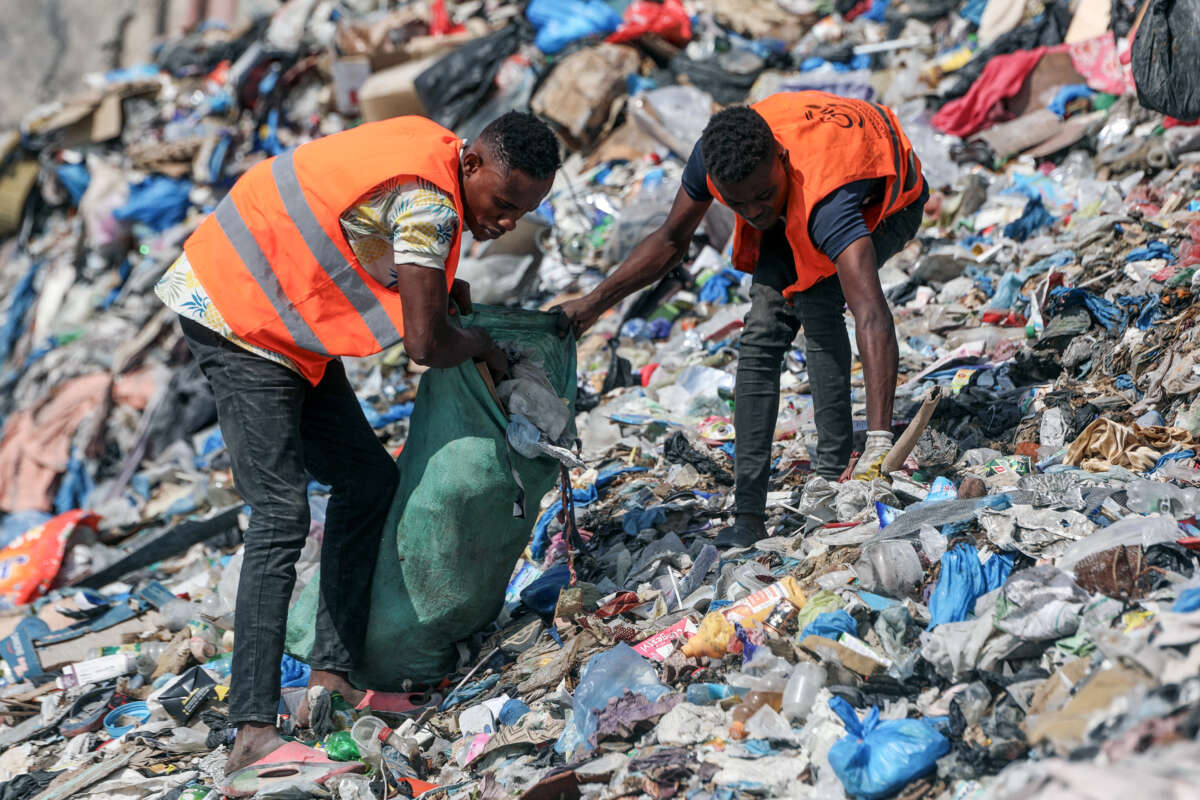Honest, paywall-free news is rare. Please support our boldly independent journalism with a donation of any size.
Environmental groups on Sunday decried the conclusion of a United Nations summit designed to secure an international treaty to combat plastic pollution after powerful oil- and gas-producing nations refused to agree to production limits and other more aggressive measures to curb pollution.
Failure to reach an agreement means the talks — known as the INC-5 round that took place in Busan, South Korea — will be extended to another round, but campaigners said the sabotage of a far-reaching treaty by fossil fuel interests is wasting precious time that the world’s ecosystems, wildlife, and people can no longer afford.
“Every day that governments allow polluters to continue flooding the world with plastic, we all pay the price. This delay comes with dire consequences for people and the planet, ruthlessly sacrificing those on the frontlines of this crisis,” said Graham Forbes, Greenpeace’s Head of Delegation to the Global Plastics Treaty negotiations.
Reuters reports that the “most divisive issues included capping plastic production, managing plastic products and chemicals of concern, and financing to help developing countries implement the treaty.”
Powerful oil producers, both private companies and governments of oil-producing nations, were seen as the key impediment to a deal. As the New York Times reported:
Saudi Arabia, Russia and other producers of petroleum, which is used to make most of the world’s plastic, have pushed back against measures that would address plastic pollution by placing curbs on excessive plastic production. The Saudis and their allies have also said they oppose any treaty that would start to list and phase out chemicals present in plastic that are thought to be harmful to health.
In closed-door negotiations late Saturday, Saudi Arabia, along with other nations, was pushing to delete entire paragraphs from the treaty text on who should finance the costs of implementing the agreement, according to a delegate with direct knowledge of the proceedings.
“Civil society, Indigenous people, waste pickers and affected peoples were locked out of the negotiations for days,” said Sam Cossar-Gilbert of Friends of the Earth International.
At the same time, Cossar-Gilbert added, “220 fossil fuel and chemical industry lobbyists registered to attend INC-5, the highest at any of the Plastics Treaty negotiations. The process is under attack by corporate power and a small minority of countries intent on nothing but blocking, weakening and delaying.”
#BreakingNews: #PlasticsTreaty Talks Stall Despite Support for Production Cuts
— #BreakFreeFromPlastic (@brkfreeplastic) December 1, 2024
Country delegates failed to agree on a Global Plastics Treaty in Busan, additional session next year. Yet civil society groups vow to keep momentum alive for an ambitious treaty the world needs. pic.twitter.com/RN41irBJai
Eirik Lindebjerg, global plastics policy lead for the World Wildlife fund, said a “week of hard-fought and frustrating negotiations” in Busan ended “with governments no closer to agreeing on a solution to the worsening plastic crisis. It has now been over 1,000 days and five negotiation meetings since governments agreed to establish a legally binding treaty to end plastic pollution. Over this time, more than 800 million tonnes of plastic has been produced, over 30 million tonnes of which have leaked into our ocean, harming wildlife, poisoning ecosystems and destroying lives, to say nothing of the plastic that has been sent to landfill or burnt.”
As did others, Lindebjerg pointed the finger at powerful nations that benefit from the plastics industry as the chief culprits to progress.
“For too long, a small minority of states have held the negotiation process hostage. It is abundantly clear that these countries have no intention of finding a meaningful solution to this crisis and yet they continue to prevent the large majority of states who do,” he said. “It is unjust that those who bear the greatest burden of plastic pollution are being denied the opportunity to forge a solution among themselves by those profiteering off the unregulated production and consumption of plastic.”
Campaigners say the following round of talks, which will conclude the treaty effort, must not follow the same path as what occurred in South Korea.
“As we move forward with the Chairs non-paper which was approved by member states at INC-5 as a basis for future negotiations,” said Cossar-Gilbert, “we demand a democratic, transparent and inclusive process for an ambitious Plastics Treaty.”
And Lindebjerg added that it is now “increasingly clear that the majority of states that are committed to securing a meaningful agreement with the necessary binding measures to end plastic pollution must be ready to vote or adopt a treaty-of-the-willing. If INC-5 has shown us anything it’s that we are not going to find the solution we desperately need through more of the same. The crisis demands more. People and wildlife demand more. And it is our governments’ job to deliver.”
Press freedom is under attack
As Trump cracks down on political speech, independent media is increasingly necessary.
Truthout produces reporting you won’t see in the mainstream: journalism from the frontlines of global conflict, interviews with grassroots movement leaders, high-quality legal analysis and more.
Our work is possible thanks to reader support. Help Truthout catalyze change and social justice — make a tax-deductible monthly or one-time donation today.
